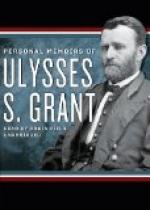If a change was to be made the selection of General Butler was agreeable to every one concerned, so far as I remember to have heard expressions on the subject. There were many who regarded the treatment of General Scott as harsh and unjust. It is quite possible that the vanity of the General had led him to say and do things that afforded a plausible pretext to the administration for doing just what it did and what it had wanted to do from the start. The court tried the accuser quite as much as the accused. It was adjourned before completing its labors, to meet in Frederick, Maryland. General Scott left the country, and never after had more than the nominal command of the army until early in 1861. He certainly was not sustained in his efforts to maintain discipline in high places.
The efforts to kill off politically the two successful generals, made them both candidates for the Presidency. General Taylor was nominated in 1848, and was elected. Four years later General Scott received the nomination but was badly beaten, and the party nominating him died with his defeat.(5)
CHAPTER XIII.
Treaty of peace—Mexican bull fights—regimental quartermaster—trip to Popocatapetl—trip to the caves of Mexico.
The treaty of peace between the two countries was signed by the commissioners of each side early in February, 1848. It took a considerable time for it to reach Washington, receive the approval of the administration, and be finally ratified by the Senate. It was naturally supposed by the army that there would be no more fighting, and officers and men were of course anxious to get home, but knowing there must be delay they contented themselves as best they could. Every Sunday there was a bull fight for the amusement of those who would pay their fifty cents. I attended one of them—just one—not wishing to leave the country without having witnessed the national sport. The sight to me was sickening. I could not see how human beings could enjoy the sufferings of beasts, and often of men, as they seemed to do on these occasions.




